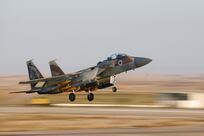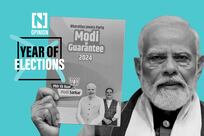If survival is a despot's measure of success, the Democratic People's Republic of Korea, conceived 50 years ago as Cain to its southern neighbour's Abel, is a model autocracy. North Korea has persevered despite a generation of sanctions and isolation, much of it self-imposed, and defied countless prognoses of its imminent demise. Last week, the US President, George W Bush, rewarded it with a symbolic gesture that could ultimately have very real consequences.
Having included North Korea in his infamous "axis of evil" speech in 2002, Mr Bush removed Pyongyang from the US list of terrorist states and peeled away a thin layer of economic sanctions, in return for the regime's modest declaration about its nuclear programme. On its face, the transaction was a minor event in the complex and often turbulent effort to make North Korea nuclear weapons free. But historians might consider it a milestone in one of the great diplomatic scandals of our era: the enshrinement and consecration of a divided Korea.
The blame is not Mr Bush's; the plot to impose Korean partition as a permanent scar on East Asia's political map has many fathers. It was hatched during the mid-1990s, when policy-makers in Washington and Seoul feared that Pyongyang would collapse and bankrupt South Korea in the process. Since then, the powers of North East Asia - where China, Russia, Japan, and Korea converge - have happily done their part to prop up the government of Kim Jong-il, the son of the nation's founder, Kim Il-sung, and now an ageing patriarch himself.
As part of an agreement signed in 1994 to dissuade Pyongyang from going nuclear, the US provides North Korea with fuel and humanitarian relief. South Korea has invested a fortune in inter-Korean development deals that includes a free-trade zone and transport infrastructure that allows its industrialists to exploit the pool of cheap labour north of the demilitarised zone. ("Seoul wants to turn North Korea into its Mexico," says one Korea hand.) At the same time, Seoul-based religious groups are building hospitals and fish farms in North Korea, in return for elaborate ribbon-cutting ceremonies - priceless grist for the fund raising mill.
China has loosened controls on its border with North Korea, fuelling a massive smuggling trade that has galvanised the economies of North Korean border towns like Sinuiju, where hotels and restaurants cater to a growing population of foreigners. Beijing has just finished work on a coal slurry pipeline that taps North Korea's abundant low-grade coal, to supplement its energy stockpiles. Russia has dusted off plans to extend the Trans-Siberian railway to the southernmost tip of the Korean Peninsula, a project that would revitalise the legendary Manchuria as the "cockpit" of East Asia, as it was once known.
And now, Mr Bush, the high priest of selective democratisation, has taken the first step towards the dismantling of economic sanctions on North Korea and the redemption of one of the world's great dictators. The token he offered Pyongyang last week can be converted by Mr Kim into new aid packages from Europe and elsewhere, an additional source of funding that will help him bankroll the loyalty of his ruling circle. When Mr Kim passes on, the cabal of general officers that is expected to succeed him will represent a web of micro-conglomerates, as well as the Korean People's Army, which is increasingly one and the same. Needless to say, unification is not part of their business plan.
The rub to all this, the manic irony for an administration that has made a fetish of paradox, is that Mr Bush's decision to engage rather than pulverise the odious Mr Kim will be his greatest foreign policy legacy. Prior to September 11 and its attendant delusional bombast, the management of international relations was a dreary, soiling affair, with restraint rather than excess as its guiding principle. In his approach to Pyongyang, Mr Bush displayed the requisite skill set for competent foreign policy making: the ability to learn from mistakes and defy ideology, a willingness to listen to allies, an appreciation of your adversary's limitations, and the courage to resist the political burlesque act, otherwise known as congress, at home.
While the elevation of North Korea to "respectable" diplomatic circles may be an unappetising tableau - and for anyone who has spent time reporting in that blighted country, it is a bitter pill indeed - it is not without precedent. South Korea was once run by brutal autocrats, as was a host of emerging markets that are now young, if not maturing democracies. It would be unfair to suggest North Korea is not capable of the same journey, however remote the destination may look today.
In Washington, this approach to foreign affairs is known as "realism". The distinction is unnecessary outside the Beltway, where reality is the only option available. @Email:sglain@thenational.ae




